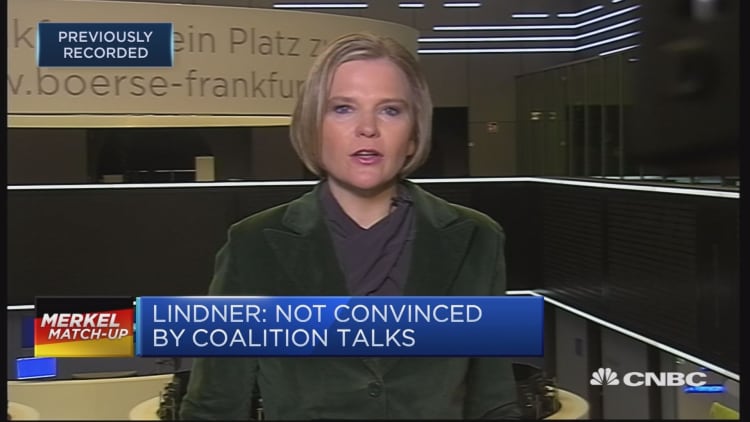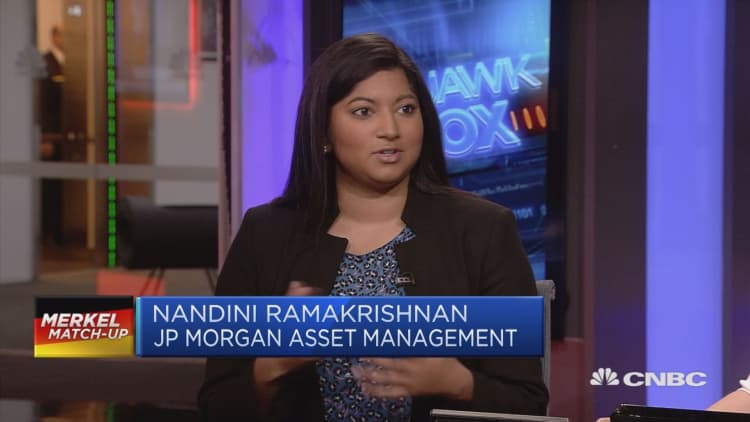Political analysts have been contemplating what could happen next in Europe's largest economy after coalition talks collapsed at the weekend, potentially putting German Chancellor Angela Merkel's leadership in doubt.
Talks between Merkel's CDU (Christian Democratic Union), the pro-business FDP (Free Democratic Party) and the environmentalist Greens fell apart with lawmakers citing irreconcilable differences. This would be the first time since World War II that a German election hasn't produced a government.
"It is a day of deep reflection on how to go forward in Germany," Merkel said following the collapse of talks. "As chancellor, I will do everything to ensure that this country is well managed in the difficult weeks to come," she added.
Merkel is set to meet with the German President Frank-Walter Steinmeier Monday to decide what to do next. He could decide to dissolve parliament and call for fresh elections within two months, but there are other ways forward, according to economists.
Three options on the table
"There are three possible options right now: minority government, another grand coalition or new elections," Carsten Brzeski, chief economist at ING, told CNBC via email on Monday morning.

"Given the way the talks now failed, a minority government looks unlikely," he added. If Merkel were to lead a minority government, passing legislation in the Bundestag would be a political nightmare given the differences between the several parties.
The second possibility — a so-called grand coalition — would mean Merkel's CDU sharing power with the Socialist Party, something that it did until the elections in September. However, this is also unlikely given that the latter has stated repeatedly that it wants to stay in opposition and rebuild.
"This realistically only leaves one option: new elections," Brzeski said. However, it's even uncertain whether the political impasse could be solved with a new vote.
Marc Ostwald, global strategist at ADM Investor Services International. said in an email that "as a point of historical note, there is no precedent for fresh general elections so quickly after the previous one."
"I would not want to second guess this situation, but with Steinmeier being president, and the risk that any or all of the CDU, SPD and FDP take a hammering if fresh elections are held, it (a minority government) might be the compromise outcome," he said.
'Bad news for Merkel'
Any of these three scenarios is bad news for Merkel, according to Brzeski, who believes that her position has been further weakened with the collapse of the talks.
"New elections would be a popularity vote on Merkel, even more than the September elections," he added.

Back in September, Merkel's conservatives suffered their worst election result since 1949 as the German far-right Alternative for Germany (AfD) saw a surge in support. The CDU and its Bavarian sister-party the Christian Social Union (CSU) won 33 percent of the vote, but that was down from 41.5 percent in the 2013 election.
Setback for Europe?
This new setback for Merkel also raises questions over Germany's future leadership of the euro zone and the direction that the country will take in the coming years.
"For Europe, this new found German instability means that the European Summit in December can almost be cancelled. At least as regards reforms of the euro zone, Germany will not be able to make any decisions," Brzeski added.
The upcoming European Summit is expected to approve plans to further deepen integration within the euro zone. It is also set to be a key moment to discuss Brexit given that both negotiating sides want to conclude talks on the exit bill, the Irish border and citizens' rights by then. In the meantime, Greece is also waiting for creditors to discuss and prepare debt restructuring for the country.
However, without clear leadership in Germany, Europe seems to be about to enter standby mode.
"Political instability in Germany is a really big deal for Europe and it will be a big deal for Europe in the years to come," Andrew Jackson, head of fixed income at Hermes Investment Management, told CNBC on Monday morning.
"It can have an impact on Greece, it can have an impact on Brexit," he outlined.
Merkel cancelled a news conference with the Dutch Prime Minister Mark Rutte on Monday.


